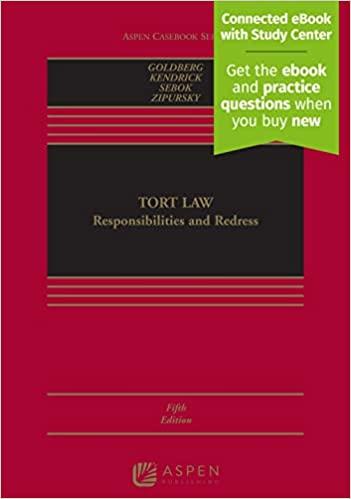Question
Louise Kalbe maintained a checking account at the Pulaski State Bank (Bank) in Wisconsin. Kalbe made out a check for $7,260, payable to cash. Thereafter,
Louise Kalbe maintained a checking account at the Pulaski State Bank (Bank) in Wisconsin. Kalbe made out a check for $7,260, payable to cash. Thereafter, she misplaced it but did not report the missing check to the bank or stop payment on it. One month later, some unknown person presented the check to a Florida bank for payment. The Florida bank paid the check and sent it to Bank for collection. Bank paid the check even though it created a $6,542.12 overdraft in Kalbe's account. Bank requested Kalbe pay this amount. When she refused, Bank sued Kalbe to collect the overdraft.
Who should win? Pulaski State Bank v. Kalbe, 122 Wis.2d 663, 364 N.W.2d 162, 1985 Wisc. App. Lexis 3034 (Court of Appeals of Wisconsin)
Dynamite Enterprises, Inc. (Dynamite), a corporation doing business in Florida, maintained a checking account at Eagle National Bank of Miami (Bank). Dynamite drew a check on this account, payable to one of its business associates. Before the check had been cashed or deposited, Dynamite issued a written stop-payment order to Bank. Bank informed Dynamite that it would not place a stop-payment order on the check because there were insufficient funds in the account to pay the check. Several weeks later, the check was presented to Bank for payment. By this time, sufficient funds had been deposited in the account to pay the check. Bank paid the check and charged Dynamite's account. When Dynamite learned that the check had been paid, it requested Bank to recredit its account. When Bank refused, Dynamite sued to recover the amount of the check.
Who wins? Dynamite Enter-prises, Inc. V. Eagle National Bank of Miami, 517 So.2d 112, 1987 Fla. App. Lexis 11791 (Court of Appeal of Florida)
Charles Ragusa & Son (Ragusa), a partnership consisting of Charles and Michael Ragusa, issued a check in the amount of $5,000, payable to Southern Masonry, Inc. (Southern). The check was drawn on Community State Bank (Bank). Several days later, Southern informed Ragusa that the check had been lost. Ragusa issued a replacement check for the same amount and sent it to Southern, and that check was cashed. At the same time, Ragusa gave a verbal stop-payment order to Bank regarding the original check. Three years later, the original check was deposited by Southern into its account at the Bank of New Orleans. When the check was presented to Bank, it paid it and charged $5,000 against Ragusa's account. The partnership was not made aware of this transaction until one month later, when it received its monthly bank statement. Ragusa demanded that Bank recredit its account $5,000. When Bank refused to do so, Ragusa sued.
Who wins? Charles Ragusa & Son. v. Community State Bank, 360 So.2d 231, 1978 La. App. Lexis 3435 (Court of Appeal of Louisiana)
Step by Step Solution
There are 3 Steps involved in it
Step: 1

Get Instant Access to Expert-Tailored Solutions
See step-by-step solutions with expert insights and AI powered tools for academic success
Step: 2

Step: 3

Ace Your Homework with AI
Get the answers you need in no time with our AI-driven, step-by-step assistance
Get Started


